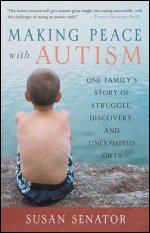Susan Senator
All happy families are not alike...

In his early years, Max followed Nat around everywhere, usually smiling, sure of his welcome, even though Nat mostly ignored him. When Nat walked into a room, toddler Max would exclaim, “Nah!” and joyfully point to Nat, delighted once again to have discovered he had a big brother. But over time, Max, whose face registered every emotion, looked puzzled by his brother’s unresponsiveness.
I knew we couldn’t go on acting as if they had a typical relationship. We needed to help Max. The sooner he understood about Nat, the better, I reasoned, so that he would not blame himself for the difficulty between them, as siblings of autistic children sometimes do. But a direct lecture about Nat’s disability made no sense at this stage. Instead, I would need to look for occasions that naturally called for explanations of the awkward interactions that left Max bewildered.
I began to discuss with Max the things that transpired between him and Nat, describing aloud to him what I imagined Max was feeling. I believed this would help him get a clearer idea of his situation, and maybe it would lessen the pain of being chronically ignored. If his feelings were clear to him, they would be easier to deal with—or so I hoped.
Copyright 2005, Susan Senator